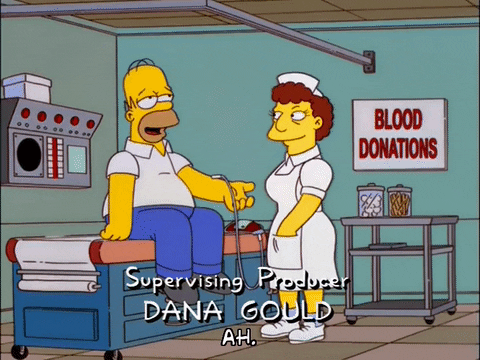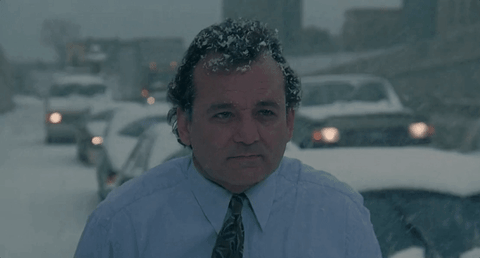
We should all be confident enough to share what’s on our minds with our health practitioners. But sometimes, when you’re racing through your current ailments (and know you’re getting charged per fifteen minutes) other, more general questions can slip your mind.
That’s why we got in touch with Emily Hilton, a registered nurse of five years who’s also worked in the Infectious Diseases ward for four years. Yes, this means she was on the front line of the COVID crisis. What a bloody hero. We asked Emily a whole bunch of health questions (including the ones that we panic-Google at 3am) and what to do if the thought of donating much-needed blood (we should all do it, tbh) makes you nervy.
Squeamish types, you’ve been warned.
Firstly, what do you think people’s biggest misconception about nursing is?
That all we do is check blood pressure and clean up after people’s bowel movements! We are skilled professionals in an ever-evolving profession, trained to manage multiple medical devices, detect and manage deterioration AND clean up after people’s bowel movements!

Do nurses create an emotional bond with patients?
This is definitely a struggle for new nurses but most of us find our boundaries pretty quickly. We need to keep boundaries in place to protect ourselves, our registration and our patients. There are plenty of patients I click with on a personal level, but we risk losing our registration if we breach professional boundaries.
I know of a few friends who struggle with long-term patients passing away. I choose to look at end-of-life care as an honour. We did everything we could for this patient, now we are able to be with them, care for them and hold their (and their family’s) hand as they find peace. I feel so lucky to do what I can to bring peace to someone’s last moments on earth.

About 1.6 million Australians donated blood in the past year, but we need many more. What’s it like seeing the result of people who have received blood transfusions?
For most patients [who need a transfusion], more than one blood transfusion is required during their hospital stay. A lot of patients need multiple per day depending on their illness. Seeing a patient go from pale and weak, to having colour in their cheeks, to being discharged home is incredibly rewarding.
These people would not survive if it weren’t for the selfless donations made by everyday people. If you are someone who donates regularly, thank you so much. Lifeblood does not exaggerate when they say that you are saving lives. If you have the ability to donate blood, please consider doing so. You’ll have a remarkable effect on someone’s life.

I want to donate blood but last time I tried, I felt dizzy. What are the remedies for people who are more squeamish around blood or needles?
Distraction techniques! If needles are triggering, wiggle your toes and concentrate on your breathing, (people often forget to breathe when they are expecting a needle and this is the cause for a lot of lightheadedness). If the sight of blood is what bothers you, bring along an eye mask, listen to a podcast or an audiobook and please let the collector know that you have had this experience in the past so they can help you out and suggest strategies of their own!

How do needles actually get blood out of your veins?
There’s a hole in the top of the needle (it’s called a bevel) and it’s on a slant so the sharp bit can pierce your skin and create a hole in your vein. This pulls back the blood!

What happens to the holes in your veins after getting a needle?
Sometimes when people have clotting disorders, they can bleed for a little bit but your platelets in your blood work pretty quickly to form a little clot and stop you bleeding.

I’ve had a cold for 4 days, why is my snot yellow today?
When you have an infection whether bacterial or viral, it’s very common to get yellow or green snot and it can last for quite a while. For some people it can be a few weeks until all of the virus has shed. The reason it’s yellow is because of cells, like the white blood cells that protect your immune system, are attacking whatever virus you have. You shouldn’t be concerned after four days, that’s fine.

My fingers and toes go purple and numb in the winter. Should I go to the doctor?
If you’re experiencing pain or it’s limiting you in some way then yes, but it’s probably just the cold affecting your circulation! In the cold, your veins constrict and keep your blood around the major organs. And then in the heat, your veins dilate!

Why is my whole body itchy after exercising?
It could be just a release of endorphins or adrenaline causing a reaction like that. If you’re out in the world, it could be a pollen allergy or something. When you feel tingly after exercising, it’s usually because of circulation and your blood rushing around.

How do I know if my appendix is bursting? It’s so common but I don’t know what to look for. I know it would be painful in my abdomen — but where?! Is it just pain from digesting dairy, my period, or having a hint of hot-girl IBS? Or is it actually my appendix giving me a warning?
Your appendix is in your lower abdomen, to the right. It is common for people suffering from appendicitis to start feeling pain close to the belly button which moves towards the right, though this is not the case for everyone. Appendicitis is caused by inflammation, which means you may get fevers or chills. People with appendicitis also often experience nausea and vomiting. It’s so frustrating that so many symptoms of appendicitis, IBS, lactose intolerance, and menstrual pains overlap.
Is it a new type of pain or one you’ve felt before? Is it cramping, shooting, stabbing or burning? Is the pain moving anywhere? Does pain relief help? Does a hot pack relieve it or make it worse? If you are in excruciating pain and are unable to relieve it, please present to the Emergency Department for help. Even if you don’t have appendicitis, extreme pain warrants a visit to the ED and you deserve to get help.

I am now a fully grown adult but still get nosebleeds randomly when the temperature changes a lot. Why is that? I was a nosebleed kid at school (lol) but I thought people grew out of it?
Oh no! Ask yourself: How much does your nose typically bleed? Does this happen when the weather shifts from cold to warm or the other way around? Can you see an opening in your skin where the blood is coming from? People who are in aircon a lot or live in a cold, dry climate can often experience drying inside the nose, making the skin delicate and easy to tear.
The best way to avoid this is to moisturise the skin inside the nose with vaseline (only a small amount, lest you create vaseline boogers). Using a cotton tip is a good option if you aren’t comfortable with putting your fingers up your nose. Also, have a humidifier in your home if this is an affordable option for you. If you’re having large volume bleeds i.e. soaking multiple tissues completely, and are finding it hard to stop the bleeding, call an ambulance or present to the Emergency Department immediately.

So there you have it. Hopefully these quelled your curiosity and gave you answers to your health conundrum. Don’t forget, these answers are general in nature so if you do have a sore abdomen, a nose spewing blood, or endometriosis pain, speak to your own GP! And, if you’re eligible, be a champ and donate blood.
See if you can help out your community with Australian Red Cross Lifeblood’s eligibility quiz, here.







